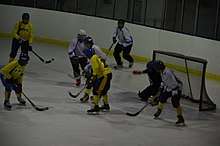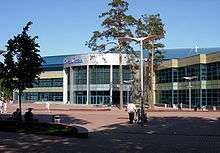Rink bandy
Rink bandy and rinkball are variants of bandy played on significantly smaller ice rinks. While a bandy rink is about the same size as a football pitch, rink bandy is played on ice hockey rinks.

Rink bandy originated in Sweden in the 1960s and was originally called hockeybockey.[1] With the arrival of indoor ice hockey arenas, it was a way for bandy players to practice on ice a longer time of the year; as bandy fields are larger, they were still only made outdoors in the wintertime when artificial freezing was not necessary.
The game uses a bandy ball and bandy sticks. The goalkeeper has no stick. As in hockey, a game lasts 60 minutes, but is composed of either two 30 minute halves or three 20 minute periods. Similar rules to normal bandy are used, but they are simplified to increase the pace of the game. Checking is prohibited, making the sport relatively safer than its relatives. Because of the smaller playing area, there are fewer players, normally six a side. In the USA Rink Bandy League, five players are used because of the smaller ice hockey rinks there.
Organisation

Rink bandy is governed by the Federation of International Bandy. In its quest to have bandy accepted into the programme of the Winter Olympics, rink bandy is an important way for the Federation of International Bandy to gain more members, thus also spreading bandy, since many countries, which lack a full-size field and where the game is still new, only play rink bandy at home but still participate in the Bandy World Championship.
As artificially frozen and indoor bandy arenas have become more prevalent, the interest for rink bandy has dwindled in the main bandy-playing nations (Russia, Sweden, Finland, Norway). There are still several rink bandy tournaments in Russia,[3] including the Patriarch Cup (Турнир на призы Святейшего Патриарха Московского и всея Руси[4]) for children at Moscow's Red Square.[5]
A world cup for rink bandy clubs was held every year from 1984-1998 in Hofors, Sweden, and called Hofors World Cup. Rink bandy was included in the programme of the 2012 European Company Sports Games[6] and a European championship existed, though there is currently no top-level international competition. However, in 2017 the Federation of International Bandy decided to hold an international tournament for developing bandy countries in Nymburk, Czech Republic[7][8] and an international rink bandy club competition called Dniprobandy has been organised by the Ukrainian Bandy and Rink bandy Federation.[9] In Germany, the national bandy championship is played under rink bandy rules.
Rinkball
In the 1970s rinkball, which is played with more ice hockey–like sticks, grew from being played in local tournaments by villagers around Finland to national-level competitions involving 100 teams or more. The sport first gained international attention in 1984 when teams from Finland and Sweden hosted one another. The International Rinkball Association was formed soon after, and in the late 1990s included Russia, Sweden, Kazakhstan, Estonia, Switzerland, Hungary, Finland and the United States.[10] The Finnish Rinkball Federation has 1000 teams, including women, men and children. Play is divided into eight male divisions, two female divisions, and children's play is divided by age.[11] The first World Championship Games for men was held in Omsk, Russia, in 1998.[10]
The Rinkball League in Finland publishes a magazine called Liiga Extra, which offers international coverage of tournaments, equipment, and tips. A national championship between the Finnish leagues is held annually (as of 2016).
References
- Skelleftepolisens IF - Rinkbandy Archived 2004-01-21 at the Wayback Machine
- https://translate.google.co.uk/translate?hl=en&sl=ru&u=http%3A%2F%2Fwww.rusbandy.ru%2Fnews%2F11118%2F
- Video of the 2nd half between Lokomotiv Orenburg and CSK VVS Samara in the 2011 Russian Rink Bandy Cup
- http://uniorsport.ru/bandy_kp_2017.php
- https://translate.google.co.uk/translate?hl=en&sl=ru&u=https://pravoslavie.ru/68869.html
- http://www.visitsodradalarna.se/en/ECSG-2012/Sports/Rinkbandy/
- European Rinkbandy Cup in Nymburk, Czech Republic
- Video from the whole 2017 European Rink Bandy Cup final
- "Information about the second international rink bandy tournament". Federation of International Bandy. 2013-07-04. Retrieved 9 August 2015.
- Rinkball history
- Finnish Rinkball and Ringette Federation